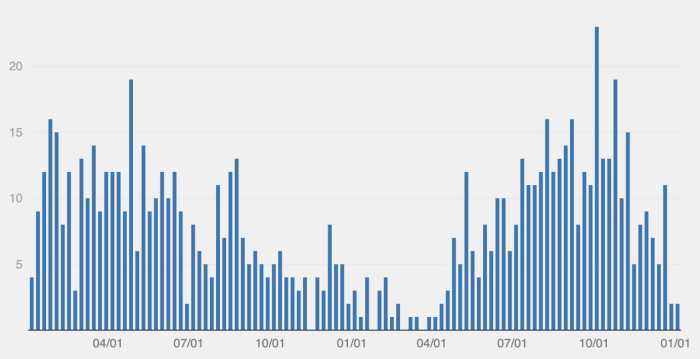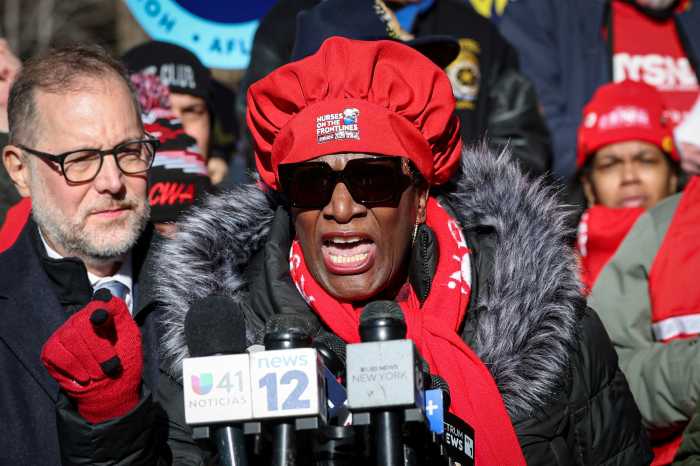Schadenfruede was at high tide, especially in the gay community, after Monsignor Eugene V. Clark, 79, rector of St. Patrick’s Cathedral and longtime grand inquisitor of the Archdiocese of New York, resigned after being named as the “other man” in a divorce suit.
Clark, who in 2003 famously blamed the sexual abuse scandal in the Catholic priesthood on gay people, was alleged to be having an affair with his $100,000-a-year secretary, Laura DeFillippo, 46, married and the mother of two.
In divorce papers, Phillip DeFillippo, her husband, includes an affidavit from their 14-year old daughter who wrote that she “found my mom and her boss [Clark] together on the couch, her sitting on his lap wearing a satin teddy with her arms around him making out.” Mr. DeFillippo also had the couple trailed by a private investigator who caught them on videotape entering a motel room at midday in the Hamptons and exiting five hours later wearing different clothes.
Clark and Mrs. DeFillippo deny, through their lawyers, having a sexual relationship. And they are charging that Mr. DeFillippo threatened to expose the affair if his wife did not agree to his terms in their divorce settlement.
But from all appearances, Clark and his secretary had a close personal relationship that included taking vacations together in St. Bart’s and weekends at the priest’s $2 million home in Amagansett in Eastern Long Island. As a diocesan priest, Clark is entitled to keep any personal fortune he has, but all Catholic priests promise to be celibate, which strictly speaking means remaining unmarried. Clark has repeatedly preached on the value of celibacy and chastity from the pulpit of St. Patrick’s and on the Eternal Word Television Network.
Eugene Clark has been an archconservative celebrity priest in New York for more than 40 years, often appearing on TV and radio. He became the communications director of the archdiocese in 1971 under Cardinal Terence Cooke, the same year the lesbian and gay rights bill was introduced in the City Council. Clark often spoke out against its passage and the measure took until 1986 to win approval.
From 1986 until being elevated by Cardinal Edward Egan to the St. Pat’s post, Egan was pastor of St. Agnes Church on West 43rd Street, hub of ultra-right activity in the Archdiocese, including the anti-abortion movement. The anti-gay cartoonist for the New York Post, Sean Delonas, painted the altar mural for the church.
At the height of worldwide attention to the sexual abuse scandal in April 2003, Clark gave a sermon calling it a “grave mistake” to ordain gay men to the Catholic priesthood and referred to homosexuality as a “disorder.” “PRIEST BLASTS GAYS,” blared the front page of the Daily News.
This attack, combined with his attempt to shift the blame for the scandal onto gay people from priests who had committed the crimes and bishops who had covered them up, led to one of the largest gay demonstrations in New York in recent years. Led by Matt Foreman, executive director of the National Gay and Lesbian Task Force, hundreds turned out to picket Clark outside his cathedral.
Conservative pundit Rod Dreher wrote in National Review of Clark’s sermon at the time, “I’m so grateful to the monsignor for having taken a brave stand in this tough city that I’m going to send last Sunday’s tithe to him, along with a thank-you note for being that all-too-rare creature: a Catholic priest with faith and guts.” Rarer than Dreher believed, apparently.
When news of Clark’s sexual scandal emerged last week, many were saying it couldn’t happen to a nicer guy given his history of moralizing and anti-gay pontificating.
Father Herb Rogers, 93, a retired Jesuit priest who did pioneering work in the area of religion and sexuality, remembers giving a talk on homosexuality in a church basement in Manhattan in the 1970s.
“Clark came in just before the talk and told me, ‘I hear you’re a wonderful speaker.’” Rogers recalled, adding that he was aware that Clark was out to catch him straying from orthodoxy so that he could have him disciplined and was therefore very careful about what he said.
Another priest source claimed that Clark took the lead in investigating and expelling priests found to be having affairs with women.
In the late 1970s, when this reporter served on the board of Dignity/New York, the gay Catholic group reached out to the archdiocese to start a dialogue. Clark and Father Kenneth Jadoff, another member of the office of communications, were sent as representatives to respond to Dignity. Rather than listen to or respond to any of the stories that were shared about being gay and Catholic, Clark simply told the group that its only recourse was repentance accompanied by an end to same-sex conduct. This reporter played a pivotal role in arranging the meeting, but also strongly condemned Clark for his dismissive tone. The session ended badly. Jadoff, a gruff young priest at the time, eventually gave up his vows to marry a woman.
In 1986, as Times Books prepared to publish John Cooney’s “American Pope,” a biography of Cardinal Francis Spellman, who served as the powerful right-wing New York archbishop from 1939 to 1967, Clark, who had been the late cleric’s secretary, heard that the book would flatly state that Spellman was a notoriously active homosexual, a fact widely known, but never before reported. Clark went into full battle mode, telling The New York Times, “These people would say it about Jesus!”
Cooney scrambled to find older gay men with firsthand experience with Spellman’s sex life. None of those he found with stories was willing to go on the record and the book was pulled by the Times so that the text could be revised to read, “For years rumors abounded about Cardinal Spellman being a homosexual.”
Also in 1986, Clark testified as a character witness for Spellman pal Roy Cohn, the viciously anti-gay, though closeted aide to the late Wisconsin Senator Joseph McCarthy; Cohn was facing disbarment proceedings for cheating his clients. Cohn died of AIDS later the same year, denying to the end that he himself was gay—a story unforgettably dramatized in Tony Kushner’s “Angels in America.”
Edward DeBonis is the New York City coordinator of a Dignity national initiative called Solidarity Sunday held every October. The group asks churches and individuals, including non-Catholics, to read a pledge to work for civil rights for all, including lesbian, gay, bisexual, and transgendered people, and to speak out against the “dehumanization” of and violence against gay people.
In 2001, just after the 9/11 catastrophe, DeBonis wrote asking 385 parishes to sign the pledge and “seven or eight did,” he recalled. His letter to Cardinal Egan was answered by Clark, who wrote that the archdiocesean priests “have spoken against crimes of violence, and I have included homosexual persons as victims.” He called such attacks “seriously sinful.”
But, Clark continued, “I think you should be realistic about parishes not cooperating with Dignity’s agenda,” calling it “not a sign of a lack of interest in the protection of such persons,” but a “hesitation to be associated with you, because your interpretation of Catholic moral theology regarding homosexual acts does not seem to reassure to practicing Catholics who make up the leadership of most of our Catholic parishes.”
DeBonis was diplomatic in assessing Clark’s current predicament.
“It’s very sad,” he said of Clark’s downfall. “If the allegations are true, it is regrettable that at least three lives have been ruined”—Clark’s and those of the DeFillippos.
Clark presided over the wedding of the DeFillippos 20 years ago, after arranging for Laura’s first marriage to be annulled by the church.
Brendan Fay, also of Dignity, led a protest at St. Patrick’s this past Sunday demanding that Clark and Egan apologize to the gay community.
“Stop scapegoating gay people,” Fay said his message was. “Some of our most wonderful leaders in the Catholic Church have been gay.” He mentioned Father Henry Nouwen, an author and missionary to the poor and disabled, and Father Mychal Judge, the Franciscan who served the Fire Department as chaplain and died at the World Trade Center on 9/11 and about whom Fay is making a documentary.
Egan was a no-show at Sunday’s mass at St. Patrick’s at which Fay appeared, though his spokesman acknowledged he was in town. The leader of the city’s Catholics has yet to make a public statement about Clark’s downfall, though press reports said that he first demanded that Clark fire his secretary. The monsignor stood by the woman.
Jeff Stone, a spokesman for the New York chapter of Dignity, said, “Beyond the obvious hypocrisy issue, the charges against Clark—if true—show that he was seriously guilty of violating church rules on sexual behavior while he was blaming the sexual abuse scandal on gay priests and the climate of sexual immorality. It’s outrageous. He has used his pulpit to spread appalling statements about our sexuality.”
Stone said that Dignity officially supports a change that might help the Clarks of the world by ending priestly celibacy.
gaycitynews.com


































